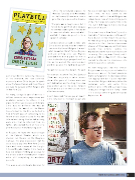part of our identity, but during the course of the interview, the tone softened, especially when Chris began to speak about Professor Fabian and the different avenues he pursued within Rutgers and in New York City. For many, college is part of identity. It defines common social experiences and academic pursuits. For others, it is a place to reflect upon values and morals. Chris was no different. He was an artist—but he wasn't at the Mason Gross School for the Arts, so he had to find different ways of connecting to his fellow artistic students and for his own internal well-being. He also had a strong work ethic that he inherited from his father, who worked hard on floor of a pharmaceutical manufacturing plant. At Rutgers, he found the improv troupe at the Cabaret Theater, which is a student run theater on the Douglass Campus. He also discovered that he could easily pop into New York City by train and take classes at the Upright Citizens Brigade theater. Chris found a balance between finding an avenue for his artistic side in the medium of theater while still completing his academic pursuits. Chris. He scheduled classes for Monday, Tuesday, and Wednesday so that he would have more time to go to the city to pursue his dreams. "Rutgers was a tough place, but it forced me to get thick skin because no one was coddling me. It forced me to take stock of who I was and what I wanted. It made me go all in for a career in comedy." Commencement arrived in 2002, and Chris did not attend. He didn't want to celebrate his time at Rutgers. It wasn't what he wanted. He left for Los Angeles and got writing jobs. Los Angeles provided him with a place for him to clear his head and get perspective of his life as he worked the entertainment world for a career. His hard work paid off. "Go get it or you can't complain," he said. For example, his show The Chris Gethard Show was originally a cable access show. After years of tireless work and self-dedication and funding, the show was picked up by the cable network Fusion and is still on their active roster after two seasons. A self-described "Jersey guy at heart," Chris returned to the East Coast and has even been back to New Brunswick. Over time, he has come to the realization that his time at Rutgers has indeed been "one of the defining parts of my life. It was not a joyful time in my life, but it did require me to stand up and care of myself." Chris now lives in New York City and is married to "the best woman in the world," Hallie Bulleit. At the time of this writing, he was beginning a new and exciting chapter in his life— the star of a one man show on off-Broadway play entitled Career Suicide that directly tackles his depression and the nuances of depression in society. This play was filmed, and it aired on HBO in May 2017. Chris has learned to channel his depression into something positive: comedy. He now recognizes that his time at Rutgers was during a period when his depression was at its most severe so blaming Rutgers for his bad experiences isn't appropriate, but it's also important to note that Rutgers did help define the comedian, actor, and writer Chris Gethard, who, in the end, just wants you to laugh at things that are funny—even if it is about something as serious as depression. 5 This was a very deliberate decision for WWW.RUTGERSALUMNI.ORG 7
